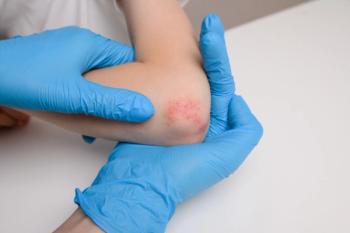
Boxed Warnings Should Not Inhibit Use of All JAK Inhibitors for AD
Brett King, MD, PhD, gave an in-depth overview of how JAK inhibitors earned a boxed warning and what it means for treating patients with atopic dermatitis at RAD 2023.
Boxed warnings for JAK inhibitors—specifically for JAK inhibitors used to treat atopic dermatitis (AD)—tend to get in the way of providing the appropriate care to patients, according to Brett King, MD, PhD. At the 2023 Revolutionizing Atopic Dermatitis conference in Washington, DC, King discussed how boxed warnings for JAK inhibitors came to be, and reviewed data demonstrating that JAK inhibitors for atopic dermatitis are significantly safer than JAK inhibitors used to treat rheumatoid arthritis (RA).1
The Oral Rheumatoid Arthritis Trial (ORAL) study investigated the comparative efficacy of tofacitinib (Pfizer) as monotherapy, tofacitinib plus methotrexate, and adalimumab plus methotrexate for the treatment of rheumatoid arthritis in patients with a previous inadequate response to methotrexate.2 After 12 malignancies were reported during the trial, the FDA ordered Pfizer to conduct the ORAL Surveillance study to assess the risk of malignancies. Patients in the ORAL Surveillance study were at least 50 years of age and had at least one additional cardiovascular risk. Patients were also taking 15 mg to 25 mg of methotrexate weekly, and approximately 57% of patients were given systemic corticosteroids. In the surveillance study, tofacitinib was compared to TNF-inhibitor adalimumab or etanercept.
From the ORAL Surveillance study, it was concluded that major adverse cardiovascular events (MACE) and cancers occurred more often with tofacitinib than with a TNF inhibitor in patients with rheumatoid arthritis that were at least 50 years of age with at least one additional cardiovascular risk factor.
King noted that despite these findings, they are not fair when judging other JAK inhibitors approved for the treatment of atopic dermatitis. When looking at actual data comparing MACE, cancer, and VTE in other approved JAK inhibitors for atopic dermatitis such as baricitinib and upadacitinib, the risk of serious adverse events is significantly reduced.
Baricitinib
- VTE risk in RA and AD: 0.49 vs 0.09
- MACE risk in RA and AD: 0.5 vs 0.09
- Malignancy risk in RA and AD: 0.9 vs 0.22
Updadacitinib
- VTE risk in RA and AD: 0.4 to <0.1
- MACE risk in RA and AD:0.4 to <0.1
- Malignancy risk in RA and AD: 0.4 to <0.1
From this data, King emphasized that it’s crucial for dermatologists to be aware of boxed warnings for JAK inhibitors, but to not let the warnings scare them away from prescribing JAK inhibitors. King ended his session by urging the audience to use caution when prescribing JAK inhibitors for atopic dermatitis, but to also consider the patient’s quality of life when they are receiving no treatment. Patients with atopic dermatitis suffer from pruritis, skin pain, sleep disturbances, asthma, and allergic rhinitis, just to name a few. Improving a patient’s overall quality of life is more important than the over-emphasized JAK inhibitor boxed warnings for atopic dermatitis treatment.
References
King B. JAK-inhibitors for atopic dermatitis. Presented at the 2023 Revolutionizing Atopic Dermatitis Conference; April 29-May 1, 2023; Washington, DC.
Fleischmann R, Mysler E, Hall S, et al. Efficacy and safety of tofacitinib monotherapy, tofacitinib with methotrexate, and adalimumab with methotrexate in patients with rheumatoid arthritis (ORAL Strategy): a phase 3b/4, double-blind, head-to-head, randomised controlled trial. Lancet. 2017;390(10093):457-468. doi:10.1016/S0140-6736(17)31618-5
Newsletter
Pharmacy practice is always changing. Stay ahead of the curve with the Drug Topics newsletter and get the latest drug information, industry trends, and patient care tips.























